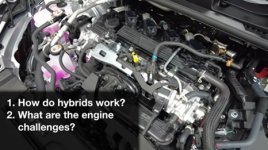evlover
Member
You're absolutely right—while hybrid vehicles offer significant benefits like improved fuel economy, reduced emissions, and smooth driving, they do have unique challenges, particularly regarding engine longevity and maintenance. Here's a closer look at the issues hybrids face and how to address them effectively:
Why Hybrids Are Hard on Engines
Frequent Start-Stop Cycles
Hybrid engines frequently turn off and on to maximize fuel efficiency. This process can:
Cause additional wear on components like starter motors and belts.
Lead to uneven lubrication as the engine doesn't consistently run long enough to circulate oil optimally.

Lower Operating Temperatures
Hybrid engines often operate at lower temperatures due to the electric motor sharing the workload. This can:
Prevent engine oil from reaching the ideal temperature to burn off contaminants.
Allow condensation to build up, leading to water dilution in the oil.
Fuel Dilution
During cold starts or short runs, unburned fuel can mix with engine oil, reducing its effectiveness. This issue is more pronounced in hybrids due to their frequent engine shutdowns.
Uneven Engine Wear
Hybrids often use small, high-efficiency engines that can be stressed when switching between electric and gas modes, especially during acceleration or towing.
How to Mitigate These Issues
Regular Maintenance
Stick to shorter oil change intervals (e.g., every 5,000-7,500 miles) to ensure contaminants are flushed out regularly.
Use high-quality synthetic oil designed for hybrids to improve lubrication and resist breakdown.
Drive Longer Distances
Regularly take the vehicle on longer drives to allow the engine to reach and maintain optimal operating temperature.
Monitor Oil Quality
Periodic oil analysis can detect fuel or water contamination early, helping you take action before significant wear occurs.
Use Manufacturer-Recommended Parts
Ensure you use OEM (original equipment manufacturer) spark plugs, filters, and fluids designed specifically for hybrid engines.
Stay Updated on Software and Firmware
Some modern hybrids include software updates that optimize start-stop systems for less wear and tear.
Are Hybrid Engines Less Durable?
Not necessarily. While hybrids have unique stressors, they also experience:
Reduced wear during idling since the engine often shuts off.
Less strain under steady-speed conditions, where the electric motor handles much of the load.
The key is proper maintenance and understanding the vehicle's hybrid-specific needs.
Considerations for Prospective Hybrid Buyers
If you primarily drive short distances or in stop-and-go traffic, be extra vigilant with maintenance.
For those planning to keep their hybrid long-term, consider an extended warranty or service plan.
Would you like tips on maintaining specific hybrid models or comparing them with alternatives like PHEVs or full EVs?
Youtube
Why Hybrids Are Hard on Engines
Frequent Start-Stop Cycles
Hybrid engines frequently turn off and on to maximize fuel efficiency. This process can:
Cause additional wear on components like starter motors and belts.
Lead to uneven lubrication as the engine doesn't consistently run long enough to circulate oil optimally.

Lower Operating Temperatures
Hybrid engines often operate at lower temperatures due to the electric motor sharing the workload. This can:
Prevent engine oil from reaching the ideal temperature to burn off contaminants.
Allow condensation to build up, leading to water dilution in the oil.
Fuel Dilution
During cold starts or short runs, unburned fuel can mix with engine oil, reducing its effectiveness. This issue is more pronounced in hybrids due to their frequent engine shutdowns.
Uneven Engine Wear
Hybrids often use small, high-efficiency engines that can be stressed when switching between electric and gas modes, especially during acceleration or towing.
How to Mitigate These Issues
Regular Maintenance
Stick to shorter oil change intervals (e.g., every 5,000-7,500 miles) to ensure contaminants are flushed out regularly.
Use high-quality synthetic oil designed for hybrids to improve lubrication and resist breakdown.
Drive Longer Distances
Regularly take the vehicle on longer drives to allow the engine to reach and maintain optimal operating temperature.
Monitor Oil Quality
Periodic oil analysis can detect fuel or water contamination early, helping you take action before significant wear occurs.
Use Manufacturer-Recommended Parts
Ensure you use OEM (original equipment manufacturer) spark plugs, filters, and fluids designed specifically for hybrid engines.
Stay Updated on Software and Firmware
Some modern hybrids include software updates that optimize start-stop systems for less wear and tear.
Are Hybrid Engines Less Durable?
Not necessarily. While hybrids have unique stressors, they also experience:
Reduced wear during idling since the engine often shuts off.
Less strain under steady-speed conditions, where the electric motor handles much of the load.
The key is proper maintenance and understanding the vehicle's hybrid-specific needs.
Considerations for Prospective Hybrid Buyers
If you primarily drive short distances or in stop-and-go traffic, be extra vigilant with maintenance.
For those planning to keep their hybrid long-term, consider an extended warranty or service plan.
Would you like tips on maintaining specific hybrid models or comparing them with alternatives like PHEVs or full EVs?
Youtube
